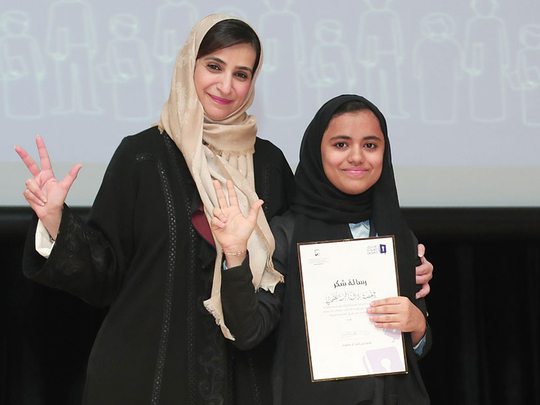
Dubai-Emirati student Hafsa Rashid Al Dhanhani was announced the winner of the second round of the Arab Reading Challenge (ARC), UAE national heats after competing with almost 318,000 students.
Amina Al Sakb from the Ras Al Khaimah Education Zone was awarded the distinguished supervisor award and the Emirates National School in Abu Dhabi received the UAE’s best school award, beating out five other finalists. All Emirati finalists were honoured at a ceremony organised by the Ministry of Education on Monday.
His Highness Shaikh Mohammad Bin Rashid Al Maktoum, Vice-President and Prime Minister of the UAE and Ruler of Dubai said: “We are proud of more than 300,000 UAE students who participated in the challenge, and I immensely congratulate Al Dhanhani. The more our children read, the more optimistic our future becomes; our goal is to empower generations of educated and tolerant graduates.”
Shaikh Mohammad said: “We will celebrate next week, at the Dubai Opera, the seven million students, 40,000 schools and 75,000 supervisors who participated in the Arab Reading Challenge across the Arab World and supported our mission. We will also honour the winning school with US$1 million, and the highest-ranking students with awards amounting to US$3 million, dedicated to promoting education and, through their learning, happiness.”
Hafsa, who is Grade 10 student at Murbah Secondary School for Girls in Fujairah, was selected on the grounds of her varied book choices throughout the competition, as well as her deep understanding of concepts and excellence in summarising, analysing and critiquing the books. Her self-confidence and ability to showcase her character, culture and personality have also contributed to naming her the winner of the challenge.
Amina Al Sakb was honoured as the most distinguished supervisor in the country; she was selected due to her unwavering commitment to the challenge, her impeccable organisational skills and her careful follow-ups with other supervisors and participating students in the Ras Al Khaimah education district. Al Sakb also designed a dedicated electronic system to follow up with teachers, and used a variety of social media channels to raise awareness of the importance of the Arab Reading Challenge, and of reading in Arabic, encouraging all students to develop reading as a daily habit.
The Emirates National School in Abu Dhabi achieved a significant increase in student participation in ARC’s second round — to stay organised, the school developed an electronic platform for student participation and follow ups. It also developed a clear and systematic reading programme in the school that appealed to students based on their interests, and that organised activities dedicated to increasing student participation in the challenge and to establishing reading as a part of day-to-day life.
Hussain Ebrahim Al Hammadi, Minister of Education, stressed the important role the Arab Reading Challenge plays in promoting reading in Arabic and enhancing the education system in the Arab world. He said: “The challenge encourages recreational reading, which engages students more positively, and improves their knowledge, critical thinking skills and overall understanding.”
Al Hammadi said: “The main objective of the challenge is to support an educated, tolerant, and open-minded generation of Arabs who are accepting others — reading is an essential tool in achieving this. It is also important that we ingrain these values in the hearts and minds of young people, promote them through engaging initiatives like ARC, and keep them at the chore of our education strategy.”
Al Hammadi also expressed his happiness at the level of student participation in the UAE, and stressed his optimism at participating in the challenge in the years moving forward.
Jameela Salem Al Muhairi, Minister of State for Public Education, said: “Improving education and supporting cultural activities in the Arab world are priorities for the UAE’s leadership, which has introduced an executive and legislative framework to institutionalise reading in the state.”
She affirmed that Shaikh Mohammad’s vision aims to build an Arab generation that can actively engage in building their future and advancing their status, which is reflected in many of the cultural and knowledge-based initiatives launched by Shaikh Mohammad.
“The participation of 318,000 students and 983 schools in the UAE reflects the importance of this project, and efforts by relevant bodies to foster reading among young people and support UAE’s efforts to promote a sustainable model for reading in the society,” she added.
The ten student finalists honoured at the ceremony, included: Aisha Saeed Al Awadhi (Grade 4 student at School of Research Science), Maryam Adnan Mohammad Al Hammadi (Grade 10 student at Julfar Secondary School for Girls), tied in third place with Haya Amad Hamdan (Grade 12 student at Al Dhabiania Private School), followed by Salamah Mohammad Al Kabbi (Grade 12 student at Al Refaa Primary and Secondary School), Fatima Abdul Rahman Al Nuaimi (Grade 8 student at Al Ittihad Private School, Al Mamzar branch), Shawq Bint Saeed Al Mahri (Grade 9 student at Al Kuwait Intermediate Girls School), Safa Ahmad Al Mahamid (Grade 9 student at Safiah Bint Hayy Secondary School), Jawiriya Abu Bakr Idris (Grade 11 student at Al Jurf Secondary School), Mariam Abeed Rashid Al Za’abi (Grade 5 student at Umm Al Fadl Bint Hamza School), followed by a tie in the 10 place between Fatima Farj Al Amiri (5th grade at Sharjah Private School) and Ranim Saleh Al Kadiri (Grade 7 student at Al Maharat Private School).
In the UAE, the number of students enrolled in the second round of the Arab Reading Challenge was 317,801 — a 100 per cent increase from last year. The students competed in two qualifiers, with over 250 making it through to the second phase in April.












